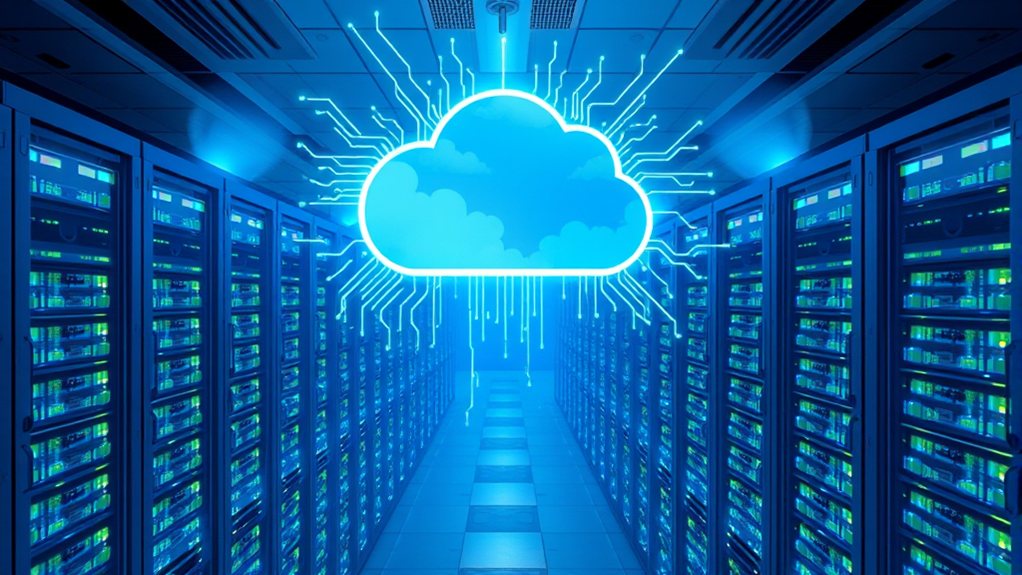Cloud mining lets people mine cryptocurrencies without buying expensive equipment. Users rent computing power from remote data centers instead of setting up their own hardware. They purchase mining contracts and receive rewards based on their share of the rented power. It's convenient with no technical knowledge required, but it comes with risks like lower profits and potential scams. The mining landscape continues to evolve as technology advances.

The digital gold rush of cryptocurrency mining has become more accessible through cloud mining. This approach allows people to mine digital currencies without owning specialized equipment. Users rent computing power from remote data centers instead of setting up their own mining rigs. The process happens "in the cloud," similar to how cloud storage works for photos and documents.
Cloud mining brings crypto digging to everyone, letting you rent digital shovels instead of buying your own.
Cloud mining works through a simple process. Users select a provider and purchase a mining contract or shares. The provider then allocates hash power based on what the user bought. As cryptocurrencies are mined, rewards are distributed proportionally to each user's rented computing power. The provider handles all technical aspects including hardware maintenance, electricity costs, and cooling systems. Users can monitor their mining activity through websites or mobile apps.
Several types of cloud mining exist to meet different needs. Hosted mining involves leasing physical or virtual servers. Hash power hosting lets users rent specific amounts of computing power. Pool mining combines resources with others to increase reward chances. With managed mining, the provider handles the entire process from start to finish. Contract mining offers fixed-term agreements for a set period of time.
Bitcoin remains the most commonly cloud-mined cryptocurrency, but others are popular too. Litecoin offers faster transaction times than Bitcoin. Ethereum ranks as the second-largest cryptocurrency by market value. Dash focuses on privacy and quick transactions. Zcash emphasizes privacy features with selective transparency options.
Cloud mining offers several advantages for newcomers to cryptocurrency. It lowers the barrier to entry since no technical knowledge is required. Users don't need to worry about equipment maintenance or high electricity bills. There's no noise pollution from mining hardware, and users can adjust their mining capacity as needed. It also provides access to professional-grade equipment that would be expensive to purchase. Some users can achieve profitability of 600 USD monthly with certain annual contracts.
However, cloud mining isn't without drawbacks. Profit margins are typically lower due to service fees paid to providers. Users lack control over the mining hardware and operations. There's also a risk of scams from fraudulent providers. Mining success depends on the provider's uptime and performance. Market volatility can also reduce returns on investment. Participants must be aware that cloud mining can contribute to the centralization of cryptocurrency as mining farms consolidate hashing power.
When considering cloud mining, several factors matter. A provider's reputation and track record are essential indicators of reliability. Contract terms should be transparent and clear. The mining efficiency, fees, maintenance costs, and payout structure all affect potential returns. Security measures are also important to protect against hacks or data breaches that could compromise investments.
Frequently Asked Questions
Is Cloud Mining Legal in All Countries?
Cloud mining isn't legal in all countries.
While it's permitted in the United States, Canada, most EU nations, Japan, and Switzerland, several countries have banned or restricted it.
China, Algeria, Egypt, Morocco, Bolivia, and Ecuador prohibit cloud mining as part of broader cryptocurrency bans.
Russia allows it with licensing requirements.
The legal landscape keeps changing as governments develop new regulations around cryptocurrency activities.
Can I Withdraw My Profits Immediately?
Immediate profit withdrawals from cloud mining aren't typically available.
Most platforms have specific withdrawal policies including minimum amounts, scheduled times (daily, weekly, or monthly), and processing delays.
Users often face waiting periods due to verification checks, network congestion, and the platform's liquidity.
Some services charge withdrawal fees or require identity verification for larger amounts.
Withdrawal options usually include transfers to crypto wallets, exchanges, or conversion to fiat currencies.
How Much Electricity Does Cloud Mining Consume?
Cloud mining consumes massive amounts of electricity.
Bitcoin mining alone uses 160-172 TWh annually, about 0.5% of global energy consumption. This equals the electricity use of Argentina and is seven times more than all of Google's operations worldwide.
While cloud mining shifts energy costs away from individuals, it increases overall consumption and produces about 22-23 million metric tons of CO2 emissions each year.
Are Cloud Mining Contracts Refundable?
Most cloud mining contracts aren't refundable. Companies typically make this clear in their terms of service.
Some providers offer short trial periods with partial refund options, but cancellation fees may apply.
Contract terms vary widely between companies. Consumer protection laws provide limited rights in certain regions.
Refund policies depend on factors like contract duration, payment method, and the provider's specific rules.
Always check refund terms before purchasing.
Do I Need Technical Knowledge to Start Cloud Mining?
Cloud mining requires minimal technical knowledge to start. Users don't need to understand complex mining algorithms or hardware specifications.
Most platforms feature user-friendly interfaces designed for beginners. The provider handles all technical aspects including equipment, maintenance, and software updates.
Basic computer skills are sufficient as the services manage the mining operations. Many platforms offer educational resources and customer support to help newcomers navigate the process.














